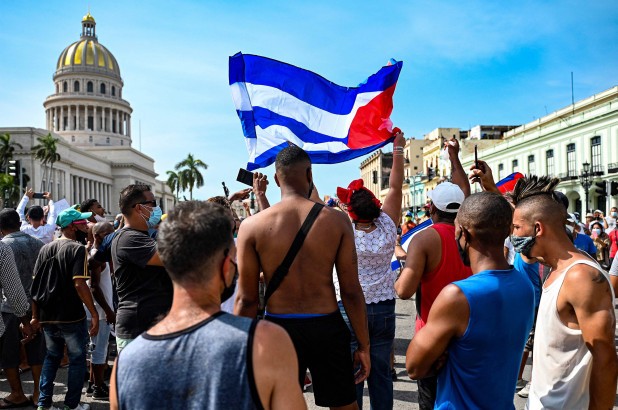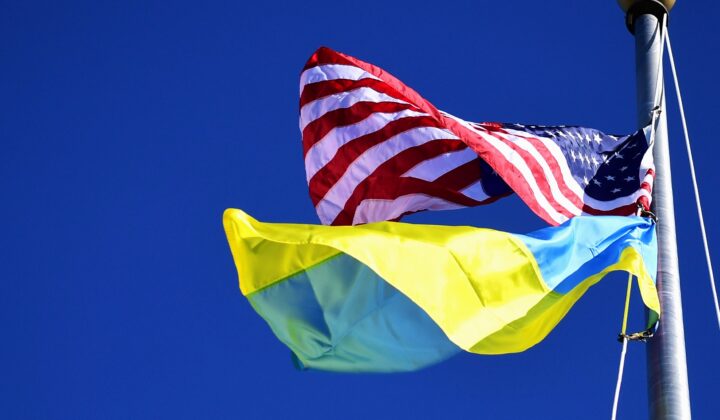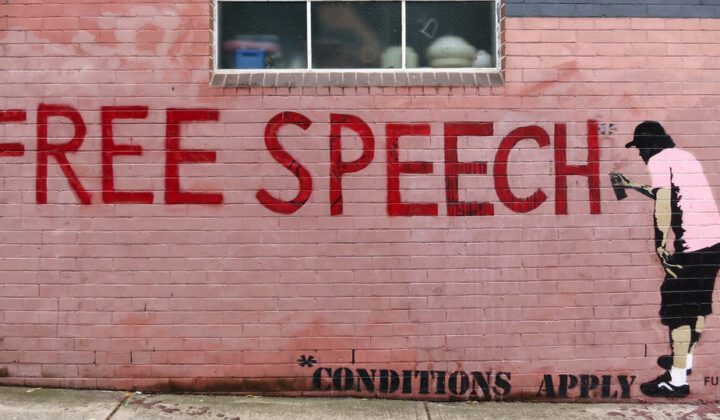Traditionally, protests in Cuba have consisted of small bands of intellectuals or activists. Not so anymore. On Sunday, chants of “libertad” rang through cities across Cuba, with everyday citizens rallying against hunger, inadequate healthcare, and a government in which they have no say. Cuban dictator Miguel Díaz-Canel blamed the unrest on “economic asphyxiation” from the United States and called for vigilante violence on Monday, saying, “The order to fight has been given — into the street, revolutionaries!”
In the U.S., Democrats and Republicans alike have expressed solidarity with protesters against the communist regime. President Biden stated on Monday that the U.S. stood with the Cuban people and heard their “clarion call for freedom” from authoritarianism. Republican Representative Liz Cheney shared similar sentimentson Twitter.
Still, not every American politician is so enthusiastic. The Democratic Socialists of America, a group which includes Representatives Alexandria Ocasio-Cortez and Rashida Tlaib, tweeted its support for the communist regime, writing that “DSA stands with the Cuban people and their Revolution in this moment of unrest. End the blockade.” (“The Revolution,” when capitalized, refers specifically to Cuba’s perpetual communist “Revolution” and supporters of the regime refer to one another as revolutionaries.) Senator Bernie Sanders offered tepid support for the protests, but then reiterated the communist claim that the American embargo is to blame.
Understandably, several prominent Republicans, including Senators Ted Cruz and Marco Rubio––both of Cuban descent––have taken the opportunity to politicize a protest movement that the two parties largely support. In a bizarre tweet on Monday, Rubio scribbled the words “Socialist and communist” on a printout of Biden’s statement condemning “Cuba’s authoritarian regime” in order to imply that the President was somehow glossing over Cuban politics.
How are Republicans taking advantage of Cuba’s protests?
Two significant factors are at play: Republicans increasingly decry the Democratic party as socialist, and Cuban Americans have emerged as a key constituency for the Republican party, particularly in keeping Florida red.
In recent years, the claim that “Democrats are socialists” has become commonplace. It was one of Donald Trump’s favorite tactics, and everyone from Nikki Haley to RNC chairwoman Ronna McDaniel has joined in, claiming that “Democrats have chosen to go down the road to socialism” and that socialism is the Biden administration’s “vision for America.” Railing against the oppressive “socialist and communist” regime in Cuba is a not-so-subtle way to suggest that Cuba’s present is America’s future should Democrats get their way.
For what it’s worth, the attacks seem to be sticking. Cuban Americans have leaned toward the Republican Party for decades, but recent immigrants from Cuba are especially likely to support Republicans. In a poll from 2020, 76% of Cubans who arrived in the United States between 2010 and 2015 identify as Republicans. Just two days before the 2020 presidential election, Rubio rallied Trump supporters before the president took the stage in heavily-Cuban Miami by saying that “Not all Democrats are socialists, but all socialists are Democrats.”
What’s wrong with calling Cuba socialist and communist?
Well, nothing. Cuba is communist, and the effects have been disastrous. Left-wing authoritarianism is no better than right-wing.
But that, in essence, is the true issue here. The selective anger of certain Republicans against left-wing authoritarianism is inconsistent as the party cozies up to right-wing authoritarians around the world. Republicans largely stayed silent as Hungary slipped into authoritarianism under right-wing strongman Viktor Orbán, whom Trump even explicitly endorsed in 2019. As president, Trump expressed similar admiration at times for Turkey’s Erdogan, Brazil’s Bolsonaro, Poland’s Duda, and the Philippines’ Duterte. Right-wing authoritarianism gets a pass from the party complicit in the Capitol Riot, which, although unsurprising, is still troubling.
Are Democrats at fault?
Comparing the Democratic Party to Cuban-style dictators isn’t very fair, but some prominent Democrats aren’t doing anything to help themselves. If Republicans have a problem condemning right-wing authoritarianism, Democrats have a similar problem condemning left-wing dictatorships. Congresswoman Karen Bass described Fidel Castro’s death in 2016 as “a great loss to the people of Cuba.” Bernie Sanders repeatedly defended or equivocated on behalf of left-wing authoritarians, including Castro and the Sandinistas of Nicaragua, as recently as February, 2020. In 1988, he took a ludicrous 10-day “honeymoon” through the spiraling Soviet Union.
Our political parties must reject authoritarianism, whether it comes from the right or the left. As long as a few Democrats continue to make exceptions when it suits their politics, the entire party loses credibility in calling out authoritarians elsewhere. The party must resolve to denounce socialism. In the meantime, Republicans would be wise to address their own right-wing authoritarian problem, which remains the greatest domestic terror threat.
American freedom can never be safe until both parties unite to uphold global democracy. Just as there is no excusing Putin or Orbán, there is no excusing Cuba’s communist dictatorship.





